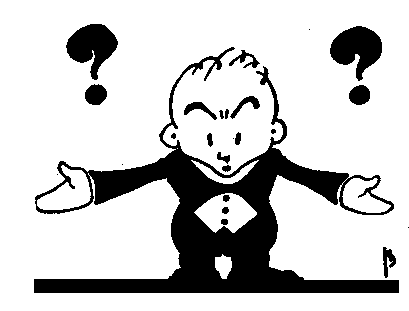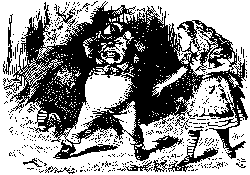
Posted 10/01/96
Perhaps Someday It Will Send Us a Postcard from Idaho
Dear Evan: I am trying to find the origins and history of usage of the phrase "ghost in the machine." Some say that it's a watered down variation or corruption of "deus ex machina." I've been paging through books trying to recall where I saw that the term was coined by Nabokov in literary criticism to describe poorly drawn or not believable characters. Can you help me out? -- Mark Laskowski, via the Internet.

Speaking of ghosts in machines, your question reminds me of a true story about the last car I owned. Say, this column sounds more like a vaudeville routine every week, doesn't it? Anyway, it was a 1982 Toyota Corolla, a beautiful little car, which ran like a charm except when it decided, for no apparent reason, not to run at all. On such occasions, my wife would insist that I return to the house and wait as she sat in the car for a few minutes, talking to it softly. The car would then start without further trouble. I later found out that she was promising the car a long drive in the country, even though we were usually just going to the grocery store. The car was, evidently, a surprisingly slow learner, and this simple ruse always worked. Then one day the car simply up and disappeared. The police said it was stolen, but I strongly suspect that it had just gotten fed up with our cheap tricks and run away from home.
But I digress. It is possible that Nabokov used the term "the ghost in the machine" in his critical essays, but he didn't invent it. According to the Oxford English Dictionary, credit for that goes to philosopher Gilbert Ryle, who coined the term in his 1949 "Concept of Mind." Ryle used the term to denote the view (with which he disagreed) of the human mind as being completely separate from and independent of the physical body.
"Deus ex machina" (Latin for "God from the machine"), on the other hand, was originally a theatrical term. Whenever a Greek or Roman playwright got himself entangled in an insoluble plot line, he always had the option, frequently exercised, of having one of the gods swoop in at the end of the last act (suspended over the stage by a mechanical apparatus) and straighten everything out. Today, the term generally applies to any unlikely or awkward dramatic contrivance.
Welcome to Microsoft Irony 6.0
Dear Evan: I spent the whole day yesterday rummaging about in libraries trying to find out where the terms "hardware" and "software" came from -- the irony of having to browse through stacks of dusty old books while looking for information about computers did not escape me, I assure you. Any ideas? -- Michael Raynor, via the Internet
Sure, I've got a great idea. Let's dump all the computers in the ocean. Then we'll have plenty of time to dust all those old books, and possibly even to read them. This may sound a bit odd coming from someone who just wrote a book called The Book Lover's Guide to the Internet, but I'll take a good book over a computer any day. Books are genuine magic -- computers are just annoying, and often useless, appliances. Nothing but overgrown toasters with attitude. Pull the plug, I say. I hope the computer I'm typing this on isn't paying attention.

While "hardware" has meant "the mechanical equipment necessary for conducting an activity" (to quote the Random House Compact Unabridged Dictionary) since the early 16th century, use of the word to mean "computer equipment" is, obviously, a bit more recent. The folks at Random House date this sense to sometime between 1955 and 1960, although the Barnhart Dictionary of New English pegs it quite precisely to 1947. Perhaps they are using different software.
"Software," meaning the programs (which are really just very complex sets of instructions) used to make computers do all the, ahem, marvelous things they do, arose at about the same time as the computer sense of "hardware." "Software" was a genuine neologism -- an entirely new word -- as opposed to "hardware," which was just a new meaning for an existing word. There's nothing particularly soft and fluffy about "software." It's just "soft" in the sense that it's less tangible and more malleable than the hardware it runs on.
The linguistic success of "hardware" and "software" have led to other terms based on the "ware" model, such as "firmware" (software permanently installed in a computer's read-only memory, or ROM), and "wetware," a remarkably unpleasant slang term for the human brain.
And Idaho Really Doesn't Exist, Perhaps We Can Convince Its Governor to Run for President
A while back, a reader wrote in to ask the origin of the name "Idaho." In my answer, I noted that "Idaho" comes from "Idahi," which is what the Kiowa-Apache tribe called their Comanche neighbors, and that, curiously enough, "Idaho" was first proposed as a name for what is now the state of Colorado. On the other hand, for some reason, folks originally wanted to call what is now Idaho "Montana." There seemed to be something fishy about the whole "Idaho" business, and I suggested in my column that the State of Idaho might, in fact, be a figment of a lazy mapmaker's imagination. According to the following letter, I am not alone in this opinion, and I think one of those nifty Congressional investigations is definitely called for to investigate this "Idaho" hoax.

Hello, Evan: I was looking through your previous columns, and came across one you wrote about the origin of the word "Idaho. In it you suggest that the state of Idaho does not actually exist. This reminded me of a professor, Dr. Hommon, who taught (and perhaps still teaches) Western Civilization at Central Connecticut University. On the first day of class, he would tell us that Idaho does not exist. To prove his point, he would then ask if anyone in the class was from Idaho. Nobody ever raised a hand. Dr. Hommon insisted that all of those "Idaho potatoes" were actually from Maine, and truckloads of potatoes were driven from Maine out to somewhere in the Midwest, where people would paint "Idaho" on them, then turn the trucks around and drive them back east.
Now that I've moved to Colorado, I find it harder to convince people that Idaho isn't real. I've even seen license plates that say "Scenic Idaho - Famous Potatoes." Now if that slogan doesn't convince you the whole thing is a hoax, nothing will! -- Jen Philion, Boulder, CO.
Dear Evan: My girlfriend wondered aloud recently on the origins of the phrase "hell bent for leather." I told her that I knew of a man who lived in New York -- where, I have been led to believe, imaginative uses of leather abound -- who had a word-origins fetish and might be able to help. So, can you whip out an answer? -- Matt Hicks, via the Internet.
Before we begin, just let me note that you seem to have a rather lurid impression of what goes on here in New York City. Gracious sakes, young feller, we New Yorkers are simple, peace-loving, law-abiding, normal folks just like you. If we had lawns, we'd mow them. If our kitchens were big enough to turn around in, we'd have bake sales. I don't know where you heard all this nonsense about leather. Anyone who's ever ridden the subway in August wearing leather underwear can tell you how impractical that is.
In any case, to answer your question, “hell bent for leather” does not seem to have a single origin -- it is probably a blending of two other colloquial sayings, “hell bent” and “hell for leather,” into one phrase.
Of the two sayings, “hell bent,” meaning “recklessly determined,” is the more common today, and has been popular since the early 19th century, describing someone who is prepared to go “to the gates of hell” in pursuit of a goal. “Hell for leather,” on the other hand, means specifically “riding (a horse) very fast and recklessly,” and is rarely heard today. The first recorded use of “hell for leather,” by the way, was in a story written in 1889 by Rudyard Kipling, who probably either invented the phrase or picked it up from British Army troops in India. Just what the “leather” in the phrase means is uncertain -- it may refer to a leather crop used to spur the horse, or it may refer to the wear and tear inflicted on the saddle by strenuous riding.
Dear Evan: The spelling may be incorrect, but the term is pronounced "sheeny man." I believe it refers to a person who buys and sells junk; a rag and bone man. I am interested to know the derivation of this term and its correct spelling. -- Mary Mulhern, via the Internet.
I must say that your question took me slightly aback, and before I answer it, I'll explain why. It reminded me of a day I remember quite clearly, although I was only about 11 or 12 years old at the time. I came marching into my parents' living room that afternoon, absentmindedly singing a little jingle I'd picked up somewhere, probably at school, as children often do. I was utterly unprepared for my mother's shocked reaction to my little song, but after she explained that one of the words in the jingle (it was "jigaboo") was a virulent slur against Black people, I was appropriately shocked myself.

So I am certain that you are as innocent in asking your question as I was in repeating that little jingle, which means that "sheeny" survives somewhere as acceptable conversational vocabulary, which is depressing, to put it mildly. "Sheeny" is a very old and extremely derogatory term for a Jewish person. It first appeared in the 19th century and its origin is uncertain, but it may be based on the German word "schon," meaning "beautiful." The theory is that Yiddish-speaking Jewish merchants pronounced "schon" as "sheen" when advertising their wares, and the word was then picked up as slang for Jews in general. While "sheeny" was at first not especially negative in connotation (and was used by Jews themselves in a joking sense in the mid-19th century), in the 20th century it has become an unambiguously anti-Semitic slur, on a par with "kike."
Of Course I Know Where It Came From.
My Uncle Invented It.
Dear Evan: You wouldn't happen to know the origin of the use of the word "Uncle" as a term to indicate surrender, would you? -- Anthony, via the Internet.
Ignoring for the moment the lack of confidence in me implicit in the phrasing of your question, I'll just say, "Yes I do. I think I do, anyway." Actually, there are several theories about "uncle," which, incidentally, I am asked about every six months or so. If there were a Hall of Fame for word origin questions, "uncle" would be a shoo-in.
The last time someone asked about "uncle," I mentioned a marvelous book called "The Lore and Language of Schoolchildren," an exhaustive study of schoolyard rituals and folklore in Great Britain written by Iona and Peter Opie and published by Oxford University Press. I was somewhat surprised to discover the Opies do not list the "cry uncle" ritual in their book. A quick check of the New Shorter Oxford dictionary, however, revealed that "cry uncle" is largely a North American ritual.

Checking other sources for the origins of "cry uncle" does provide support for one of the Opies' most interesting assertions, that childhood games and rituals are often hundreds, and in some cases thousands, of years old. It seems that while "crying uncle" is today regarded as an Americanism, its origins go all the way back to the Roman Empire. Roman children, when beset by a bully, would be forced to say "Patrue, mi Patruissimo," or "Uncle, my best Uncle," in order to surrender and be freed.
As to precisely "why" bullies force their victims to "cry uncle," opinions vary. It may be that the ritual is simply a way of making the victim call out for help from a grownup, thus proving his or her helplessness. Alternatively, it may have started as a way of forcing the victim to grant the bully a title of respect -- in Roman times, your father's brother was accorded nearly the same power and status as your father. The form of "uncle" used in the Latin phrase ("patrue") tends to support this theory, inasmuch as it specifically denoted your paternal uncle, as opposed to the brother of your mother ("avunculus"), who occupied a somewhat lower rung in patrilineal Roman society.
Take me back to the main Word Detective page.
Take me to the Index of back columns.